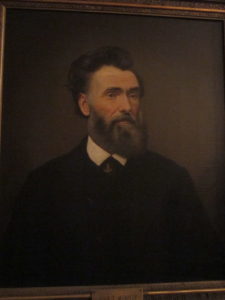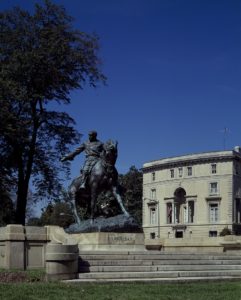In mid-March 1867 General Philip Sheridan was appointed to command one of the five military districts that Congress created in the South. His Fifth District was made up of Texas and Louisiana. By the end of the month he had removed and replaced three officials in Louisiana. From The New-York Times March 28, 1867:
IMPORTANT ORDER OF GEN. SHERIDAN.
_____
Removal of Civil Officers in Louisiana and new Ones Appointed.
NEW-ORLEANS, Wednesday, March 27.
The following order was issued to-day:
HEADQUARTERS FIFTH MILITARY DISTRICT.
GENERAL ORDER NO. 5. – ANDREW S. HERRON, Attorney-General of the State of Louisiana; JOHN T. MONROE, Mayor of New-Orleans, and EDMUND ABELL, Judge of the First District Court of the City of New-Orleans, are hereby removed from their respective offices, from 12 M. to-day:
The following appointments are made, to take effect the same date:
B.L. LYNCH, Attorney-General of the State of Louisiana; EDWARD HEATH, Mayor of New-Orleans, and W.W. HOWE, Judge of the First District Court of the City of New-Orleans. Each person removed will turn over all books, papers, records, &c., pertaining to his office, to the one appointed thereto. The authority of the latter will be duly respected and enforced.
By command of
Major-Gen. P.H. SHERIDAN
GEORGE L. HARTSUFF, A.A.G.
Mr. HEATH, the new mayor, is a well-known merchant of this city.
In his Memoirs published in 1866 General Sheridan described taking command of the Fifth Military District (Texas and Louisiana) and soon after replacing the three officials:
The first of the Reconstruction laws was passed March 2, 1867, and though vetoed by the President, such was the unanimity of loyal sentiment and the urgency demanding the measure, that the bill became a law over the veto the day the President returned it to Congress. March the 11th this law was published in General Orders No. 10, from the Headquarters of the Army, the same order assigning certain officers to take charge of the five military districts into which the States lately in rebellion were subdivided, I being announced as the commander of the Fifth Military District, which embraced Louisiana and Texas, a territory that had formed the main portion of my command since the close of the war.
Between the date of the Act and that of my assignment, the Louisiana Legislature, then in special session, had rejected a proposed repeal of an Act it had previously passed providing for an election of certain municipal officers in New Orleans. This election was set for March 11, but the mayor and the chief of police, together with General Mower, commanding the troops in the city, having expressed to me personally their fears that the public peace would be disturbed by the election, I, in this emergency, though not yet assigned to the district, assuming the authority which the Act conferred on district commanders, declared that the election should not take place; that no polls should be opened on the day fixed; and that the whole matter would stand postponed till the district commander should be appointed, or special instructions be had. This, my first official act under the Reconstruction laws, was rendered necessary by the course of a body of obstructionists, who had already begun to give unequivocal indications of their intention to ignore the laws of Congress.A copy of the order embodying the Reconstruction law, together with my assignment, having reached me a few days after, I regularly assumed control of the Fifth Military District on March 19, by an order wherein I declared the State and municipal governments of the district to be provisional only, and, under the provisions of the sixth section of the Act, subject to be controlled, modified, superseded, or abolished. I also announced that no removals from office would be made unless the incumbents failed to carry out the provisions of the law or impeded reorganization, or unless willful delays should necessitate a change, and added: “Pending the reorganization, it is, desirable and intended to create as little disturbance in the machinery of the various branches of the provisional governments as possible, consistent with the law of Congress and its successful execution, but this condition is dependent upon the disposition shown by the people, and upon the length of time required for reorganization.”
Under these limitations Louisiana and Texas retained their former designations as military districts, the officers in command exercising their military powers as heretofore. In addition, these officers were to carry out in their respective commands all provisions of the law except those specially requiring the action of the district commander, and in cases of removals from and appointment to office.
In the course of legislation the first Reconstruction act, as I have heretofore noted, had been vetoed. On the very day of the veto, however, despite the President’s adverse action, it passed each House of Congress by such an overwhelming majority as not only to give it the effect of law, but to prove clearly that the plan of reconstruction presented was, beyond question, the policy endorsed by the people of the country. It was, therefore, my determination to see to the law’s zealous execution in my district, though I felt certain that the President would endeavor to embarrass me by every means in his power, not only on account of his pronounced personal hostility, but also because of his determination not to execute but to obstruct the measures enacted by Congress.
Having come to this conclusion, I laid down, as a rule for my guidance, the principle of non-interference with the provisional State governments, and though many appeals were made to have me rescind rulings of the courts, or interpose to forestall some presupposed action to be taken by them, my invariable reply was that I would not take cognizance of such matters, except in cases of absolute necessity. The same policy was announced also in reference to municipal affairs throughout the district, so long as the action of the local officers did not conflict with the law.
In a very short time, however, I was obliged to interfere in municipal matters in New Orleans, for it had become clearly apparent that several of the officials were, both by acts of omission and commission, ignoring the law, so on the 27th of March I removed from office the Mayor, John T. Monroe; the Judge of the First District Court, E. Abell; and the Attorney-General of the State, Andrew S. Herron; at the same time appointing to the respective offices thus vacated Edward Heath, W. W. Howe, and B. L. Lynch. The officials thus removed had taken upon themselves from the start to pronounce the Reconstruction acts unconstitutional, and to advise such a course of obstruction that I found it necessary at an early day to replace them by men in sympathy with the law, in order to make plain my determination to have its provisions enforced.


![Maj. Genl. Philip H. Sheridan: U.S. Army (New York : Published by Currier & Ives, [between 1856 and 1907]; LOC: https://www.loc.gov/item/2002709994/)](https://www.bluegrayreview.com/wp-content/uploads/2017/03/3b50680r-212x300.jpg)

![Mardi Gras celebration in New Orleans, Tuesday, March 6 - Procession of the "Mistick Krewe of Comus" [Epicurean floats] ( Illus. in: Frank Leslie's illustrated newspaper, vol. 24, no. 601 (1867 Apr. 6), p. 41. )](https://www.bluegrayreview.com/wp-content/uploads/2017/03/3b10164u-1024x674.jpg)